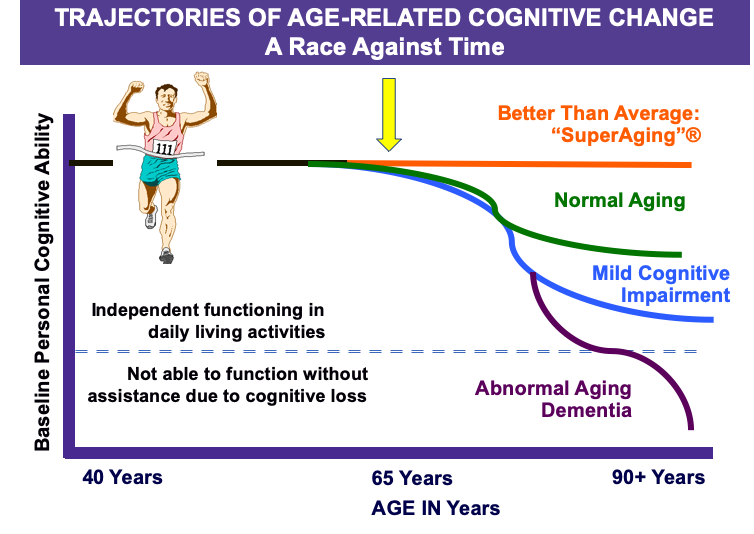Is it dementia or normal aging?
Many think of aging as the deterioration of the body and mind, but aging doesn’t always mean losing ability. Scientists talk about the continuum of cognition over the lifespan, and yes in one’s 50s and 60s, changes are more pronounced. Typical age-related cognitive change includes things like walking into a room and forgetting why you went in there. It doesn’t mean you’re developing dementia, because ultimately it doesn’t interfere with your daily life, says Sandra Weintraub, PhD.
Aging increases risk of dementia, but there are so many different aging trajectories.

This graph depicts the current concept of cognitive aging.
Beginning at 40 years, when adults begin to experience a change in the quality of cognitive functions but not necessarily a decline, the dashed line represents a level of daily functioning. Any curve falling above the dashed line is considered a level of cognitive ability that does not interfere with daily life. The curve that slips below the dashed line represents a level of cognitive ability that cannot sustain normal routine activities, like paying bills or driving.
With the different aging trajectories in mind, here are some things to consider when thinking about a dementia diagnosis.
Normal Aging
Normal aging may mean slower processing speed and more difficulty with multitasking, but routine memory, skills, and knowledge are stable and may even improve with age. It’s normal to occasionally forget such things as where the keys were last placed or the name of the person you just met because many times we don’t pay attention to these at the time they happen. Forgetting recent events, such as a party you attended last week, however, is more of a concern.
Knowledge improves with age, but memory skills do not. With age an individual might not be able to remember as much as they could when younger, but usually these things are annoying but not incapacitating.
Dementia
Contrary to popular belief, dementia is not a normal outcome of aging, but is caused by diseases that affect the brain. Dementia influences all aspects of mind and behavior, including memory, judgment, language, concentration, visual perception, temperament and social interactions. Dementia is a “syndrome” not a disease. A syndrome is a set of symptoms that an individual experiences, and others observe, as a change in their usual way of thinking or behaving.
There are several types of dementia syndromes which affect different areas of cognition. Primary progressive aphasia affects language, while Alzheimer’s disease dementia affects memory. Alzheimer’s disease is one cause of dementia but there are many others, such as Lewy body disease and frontotemporal lobar degeneration.
Learn more about dementia syndromes here.
Disease that affects the brain is what causes dementia and we are still learning more about how Alzheimer’s disease, Lewy body disease, and frontotemporal lobar degeneration affect different areas of the brain to cause a dementia syndrome.
When there is really serious memory loss, the person might not realize that they are not remembering something. An example is, telling someone the same story several times or asking the same question. Often the person is not aware that they are repeating themselves. Another example is getting lost in a familiar place. On occasion, these incidents happen to many of us, but if this is part of a pattern, it might represent a larger problem.
SuperAging
SuperAging has become a popular term in the media, but at Northwestern, it’s really a coined research term. In our research study, individuals who are designated “SuperAgers” are defined as individuals who are 80 years of age and older and have cognitive ability at least as good as people in their 50s or 60s. A variety of factors contribute to SuperAging including cognition, personality traits, psychosocial factors, genetic factors, and brain structure.
Studying SuperAgers is important to understand what is going right with aging. Research has shown that one thing that set these individuals apart is a high population of specialized brain cells called Von Economo neurons. These neurons are theorized to be important for social interaction: they are only found in complex species with high sociality such as elephants, dolphins and whales, and individuals with dementia disorders often have substantial losses of these neurons.
SuperAgers have four to five times the number of Von Economo neurons and a reduced rate of cortical thinning when compared with normal aging adults, according to a study published in JAMA.
Maintaining Brain Health
Here are some simple tips for maintaining brain health.
- Get enough sleep!
Sleep is necessary for memory consolidation. A lack of sleep can compromise your ability to focus throughout the day and lead to unreliable establishment of memories. - Manage stress.
Stress makes concentration difficult, and long-term, chronic stress compromises memory function. Cortisol, the stress hormone, can damage the hippocampus in the brain over time. - Keep your mind active.
Regularly engage in an activity that is meaningful to you and also challenges you. Puzzles, reading, woodworking, and other stimulating activities will help to improve cognitive function. - Move your body.
The American Heart Association recommends 150 minutes of cardiovascular exercise at moderate-intensity per week, or 75 minutes of vigorous aerobic activity per week, and moderate to high intensity muscle strengthening activity twice a week. Exercising three or more times a week has been linked to a lower risk of dementia. Exercise increases oxygen to the brain. As we age, we need that increased oxygen and blood flow to the brain. - Fuel your body properly.
Body, mind, and social well-being all contribute to nutrition. A diet rich in antioxidants and omega-3 fatty acids has been shown to enhance brain function.